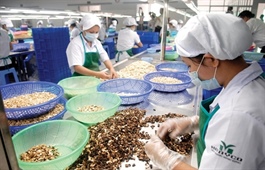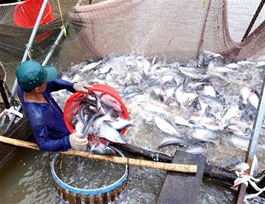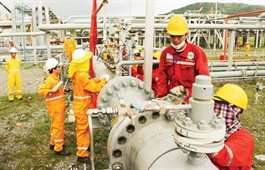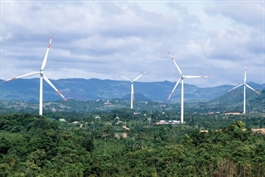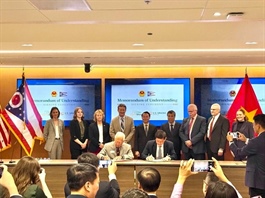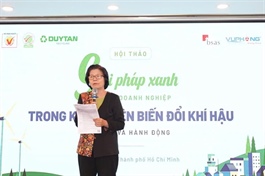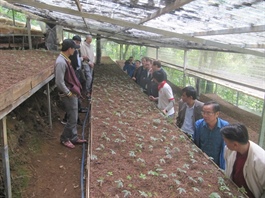Food production links tightened for safety
Food production links tightened for safety
Several localities and businesses are increasing efforts to expand links from production to consumption, so as to enhance food safety for consumers.
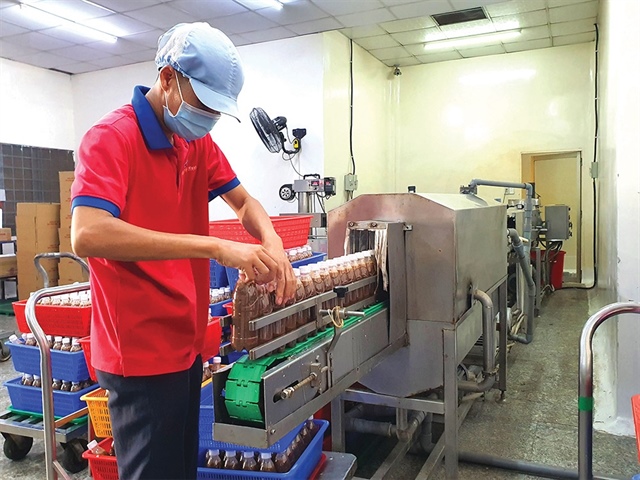
The agricultural linkage chain from production to consumption is being boosted, photo Le Toan |
The Hanoi Agricultural Promotion Centre and Me Linh People’s Committee last week held a forum on the links between production and consumption of products. This was the first of eight forums that the centre, under Hanoi Department of Agriculture and Environment, is holding this year.
According to the centre, Hanoi’s agricultural supply is being influenced by multiple factors, notably climate change and rapid urbanisation, which are exerting increasing pressure on agricultural land, particularly in suburban districts that were once the city’s main supply sources. In particular, the links between production, procurement, distribution, and consumption remain weak, with a lack of long-term contracts, making it challenging to regulate supply, especially during peak seasons or times of supply-demand imbalances.
Doan Duc Dan, deputy director of the centre, said the forum provides a valuable opportunity for farmers to exchange knowledge with organisations, associations, and businesses on scientific advancements in cultivation, livestock farming, aquaculture, and product consumption links.
“Organising linkages from production to consumption in value chains plays a crucial role in ensuring sustainable agricultural production,” Dan said. “This activity also contributes significantly to managing the production-to-consumption chain, ensuring quality, safety, and protecting consumer interests.”
Additionally, changing consumer preferences in the capital, with increasing demands for food safety, traceability, and environmental friendliness, are placing urgent requirements on improving the quality and organisation of agricultural production, Dan explained.
Hanoi’s livestock production sector is also developing into a commodity production industry, applying advanced science and technology to achieve high economic efficiency, with livestock contributing over half to the agricultural GDP.
Establishing value chain links in agricultural production is seen as a breakthrough in production, processing, and delivering safe food to consumers. The city has actively developed these chains, including 17 livestock consumption chains with over 3,400 participating members, 30 trading points, and more than 1,300 product distribution agents and points. Other notable chains include IDP International Dairy Company, Minh Duong Food, C.P. Vietnam, Dabaco, and Japfa Vietnam.
A Japfa Vietnam representative told VIR that the company has partnered with farmers across cities and provinces to establish large-scale, centralised farming models that deliver high economic efficiency.
“In these partnerships, vaccinations are fully implemented, and feed is tailored to each growth stage. With strict management and monitoring of breeds, feed, and disease prevention, livestock grows healthily, producing high-quality products,” the representative said.
“Through these linked models, a group of farmers has been trained in modern commodity agricultural production, shifting from spontaneous practices and overuse of veterinary drugs and unregulated feed, which harm health and the environment, to safe production practices that prioritise environmental protection,” the representative added.
Along with Japfa Vietnam, other localities also aim to expand closed-loop chain models for production, preliminary processing, preservation, and consumption, supplying products locally and linking with businesses for distribution, such as Phu Gia Agricultural, Hien Nhuan Production and Trading, and C.P. Vietnam.
Last week, C.P. Vietnam issued a statement reaffirming the safety of its operations after false allegations were spread on social media. Two separate Facebook and Zalo accounts posted images purporting to be “dirty” meat being mixed into the company’s distribution system.
“All content posted by the accounts shows signs of defamation, intentionally damaging the reputation of the company. The images are of unknown origin and are absolutely not product images of the company,” C.P. Vietnam said.
Meanwhile, the international community also supports Vietnam in enhancing food safety. The Safe Food for Growth scheme, funded by the Canadian government, is one example. In March, it organised a study tour to Taiwan on food safety at wholesale and traditional markets for its partner market management boards and local authorities.
Deputy Minister of Agriculture and Environment Phung Duc Tien said that establishing chains between local management agencies, businesses, and farmers is an urgent requirement due to the concerns about the quality of food. However, production-consumption links in localities are not yet deep enough.
“Localities need to establish specific support mechanisms for external businesses looking to invest in such links,” Tien said. “Localities and businesses need to regularly exchange information and introduce production, preliminary processing, and processing facilities that meet food safety standards.”
- 16:00 06/06/2025




